Travel Writing: Camel Related Desert Shame
For the record, a camel saddle isn’t a saddle at all. It is an implement for punishing the rider’s hips and genitalia. And it works horrifyingly well.
I spent three days on such a device during November of 2004, when I drifted into the city of Jaisalmer in Rajasthan and booked a camel safari, apparently in deference to some deep seated masochistic urge. Three days in the desert. Three days of ticks and spitting animals and rats running across my face in the night. Three days of rolling, honeyed-dunes and ancient, wind polished ruins and story telling while cooking chapati around a tiny campfire. Three nights spent staring up at an endless carpet of shimmering stars.
I shared the trip with four other tourists: a curly haired American woman, a Spanish dude with a shaved head, and an Israeli couple. The presence of Israeli Jews made me feel a bit better. Surely they knew something about wandering the desert. My hopes were dashed on day two when Tomer turned to me, lurching and bouncing on the back of his camel, and said “I no longer believe the Jews wandered the desert for forty years. Forty days maybe, but not forty years.”
“Well shit.” I said. “I thought you two would handle this just fine.”
Tomer’s girlfriend, who’s name eludes, snorted derisively. Or it might have been a camel fart, I don’t know. The beasts produce a cacophony of noises ranging from hilarious to disturbing to just plain confusing. They’re pretty awesome though, with their eternal regurgitation and their tennis ball shit. They seem to have pulled themselves, fully formed, from the early primordial ooze, long before the first fishes even developed scales, only to plod off across the meteor scarred hell-scape of the early earth in search of brambles to munch. Every time I look at a camel I get the impression that its ancestry predates dinosaurs.
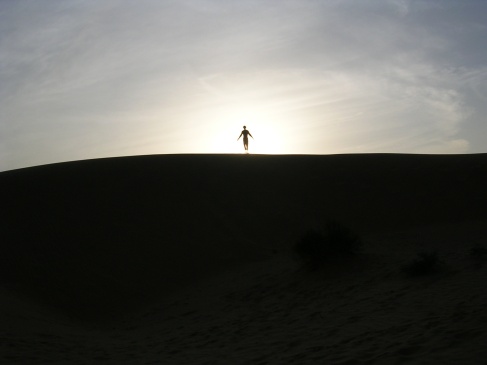
Tomer on a dune
Our guides on the trip were three coffee-skinned men with piercing eyes. I only remember two of them clearly. One wore light blue from head to toe and spoke softly. He rarely made eye contact and seemed able to communicate with our humpy desert steeds. He would stroke the camels and whisper to them, apparently oblivious to the miasma of vomit-stink emanating from their constant ruminations. He often sang to them, softly, mouth close to their ears. He worried most about the baby of our tiny herd, who had only recently received a nose piercing. I think his name was Amir.
“It is paining,” he said, indicating the bar through the bridge of his young camel’s nose. “It is new so it is paining, and he cry.” Amir spoke broken English, but without too much accent, and he was easy to understand. I found out later that in addition to English and his native Urdu, he spoke Hindi, Arabic, French, and enough Spanish to joke around with the Spanish guy on the tour.
“How do you make the hole?” I asked.
“It is…I don’t know how to say….” He brought one hand up with his three lower fingers curled in and his thumb straight, like a little kid playing cowboy. “ZZZZZZZ!” he said, driving his finger forward through the air. “Very fast!”
“A power drill?” I asked. “You drill through its face with a power drill?” My ass and hips hurt as we bumped along through the desert, but at least no one was drilling a hole in my face.
“Yes!” he said, smiling broadly. “A drill!” He gave a gentle tug on the reigns to correct his animals course, and the young camel screamed across the dry plain, producing the kind of noise I imagine Chewbacca might make were he being water boarded.
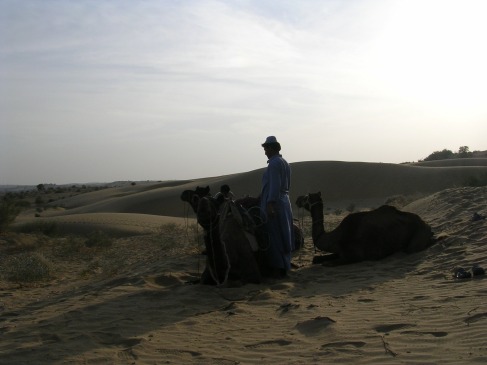
Amir with friends
One day we crept into a village with a deep well where we watered the camels and refilled our own big, blue, plastic jugs. It was a dusty, windswept place, where the brightly colored saris of local women stood out in piercing greens and reds against the endless yellow landscape of the Great Thar desert. The fields around the tiny collection of mud-brick shanties sat fallow, cracked and painfully dry. Amir explained that the last two monsoons had been weak, and the people who hadn’t left for cities barely managed to survive.
I saw a family there – A mother with an earthenware water jug perched on her head, two girls in dresses, a young son in a colorful t-shirt and no pants. They had nothing. I took their photograph but in return could offer only pity and shame.
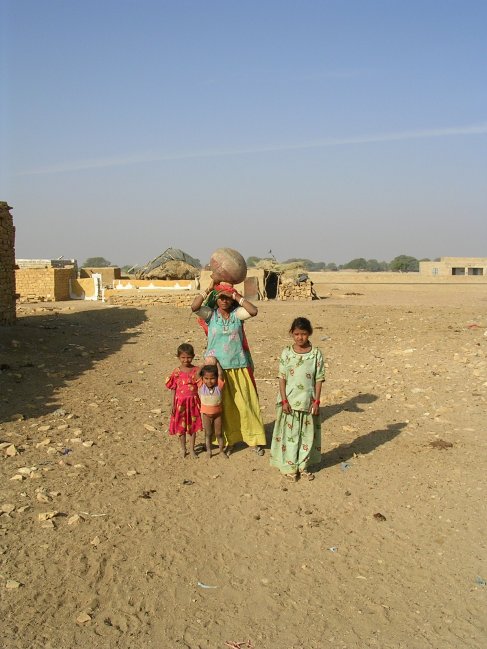
At night, we sat around the campfire listening to the other guide, who I remember clearly. His name was Mohammad, a name ubiquitous throughout the Muslim world. He was loud and brash and always singing. Mohammad made our chapati at night, around the campfire, where he constantly told the same joke.
“Mohammad, can I have another chapati, please?”
“Puh-leeze!? PO-leeeeeeese? No Police here! Only camel man! Ha HAAA!”
He always wanted us to sing, and at night we shared songs from home. I remember the other American on the trip sang ‘Take Me Out to the Ballgame,’ and one night I sang the first two versus of ‘Subterranean Homesick Blues’.
“That was good!” said the Spaniard. “Even though I couldn’t understand any of it.
“That’s okay,” I said. “Neither can most Americans.”
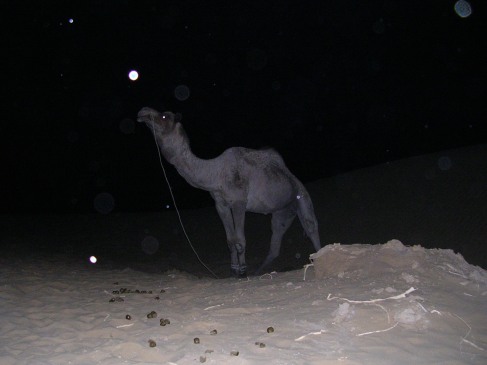
Night camel with tennis ball shits
On day three I got sick. Some kind of vicious desert flu swept into my cells and began to corrode me from the inside out. I was scheduled for a fourth day, but the Israelis had a jeep coming to take them back to town, and I decided at the last moment to jump in with them and abandon the tour. The other American woman and her Spanish friend had left the previous day, so it was just me and them, driving away through the desert as Amir stood and watched with the camels. I remember his face. The look of surprise, of consternation. I felt so horrible and ill that I forgot to tip him. I just left him in the middle of the desert to make the long walk home with Mohammad and the animals.
Back in Jaselmeer I destroyed my daily budget by renting a hotel room with its own toilet and shower, where I curled up on the bed and spent two days alternating between soaking sweats and uncontrollable shivering. I coughed, I hacked, I sniffled, and every time I felt sorry for myself I pulled out my camera and looked at the picture of the family in the desert village. I struggled to make the trip downstairs for bottled water.
After forty eight hours I felt better. I wandered out into town to plod around the rust red streets of Jaisalmer and marvel at its ancient pedigree. I stared up at the fort, its massive ruddy walls dominant across miles of desert, and I struggled to contemplate its ancient immensity. Its continual occupation since it was built in 1156. The Fort is a city within a city, a civilization at rest trapped inside a world speeding forwards. Inside its labyrinthine walls I encountered shamans and children, painters and artisans, lepers and messiahs of all kinds. One family took my on a tour of their home, with low ceilings and immaculate floors it felt vaguely surreal, like a half remembered dream.
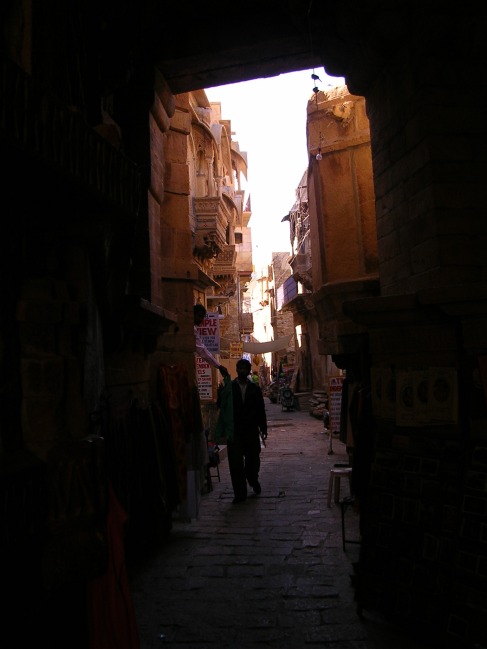
A street inside the fort
As I left the fort through the massive tunnel of its gate, a voice stopped me abruptly.
“Kebin,” it said softly. Amir stood in front of me, frowning gently. “Are you okay?”
That his first question was about my well-being killed me.
“Yes! Yes yes! I’m fine! I’m so sorry I left early! I was very sick and I didn’t think I could be in the desert anymore.” This to a man who had lived his entire life in the desert. Who rode a camel with the same casual comfort that I find in the passenger seat of a car.
“You left early,” he said. “I thought maybe you had a bad time.” He half smiled and looked at the ground.
“No No!” I insisted. “I’m sorry! It was great!” And I meant that. It had been great. A little uncomfortable maybe, but beautiful and unlike anything I had experienced before. “I was just sick,” I repeated. I grabbed my wallet and pulled out a fistful of rupees, but when I tried to give them to Amir he pressed them back into my hand.
“It’s not money, but my boss thought maybe you had not a good time.”
“It was great!” I said again. “I wish I had been able to stay for the last day!” I tried to hand him the money again, but once more he refused.
“Okay,” he said. Then he shook my hand and walked away, droop shouldered and shuffling.
I went straight to the agency where I had booked the tour to talk to Amir’s boss. I’d had a great time, I insisted. It wasn’t his fault at all, I just got sick! Could you please make sure he gets this money?
I doubt any of that cash found its way to Amir, but maybe it did. Really, I just hope he didn’t lose his job. I like to think of him out there, wandering through the desert, showing idiot tourists like me his home; A landscape of sand and scrub, poverty and resilience. Looking out across the dunes. Smiling. Singing softly into the ears of camels.
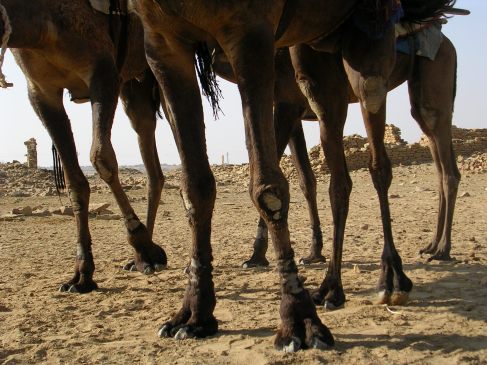
Post a comment